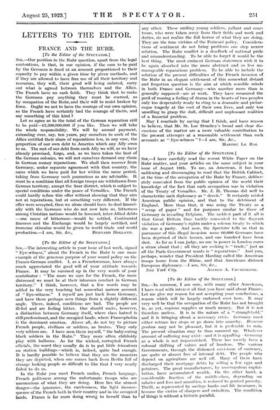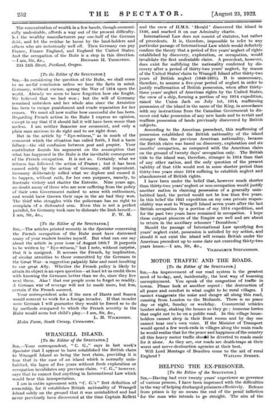[To the Editor of the SPECTATOR.] SIR,—In common, I am
sure, with many other Americans, I have read with interest all that you have said about France; Let me give my reason for not accepting your conclusions, a reason which will be largely endorsed over here. It may very well be that the occupation of the Ruhr has not brought in, as yet, copious supplies or much money. But it is not therefore useless. It is in the nature of a "stranglehold," and it is bringing about a necessary crisis. Germany must either retrace her steps or go down into anarchy. Revorare graduni may not be pleasant, but it is preferable to ruin. The present situation may be thus summed up. Whatever amount of suffering may exist—and it is appalling—Germany as a whole is not impoverished. There has merely been a colossal shifting of values and of burdens. The various Governments, through the dishonest over-issue of currency, are quite or almost free of internal debt. The people who depend on agriculture arc well off. Many of them have discharged their mortgage debts by selling a few eggs and potatoes. The great manufacturers, by unscrupulous exploi- tation, have accumulated wealth. On the other hand, a considerable fraction of the middle-class, depending on salaries and fees and annuities, is reduced to genteel poverty. Thrift, as represented by savings banks and life insurance, is become the victim of sharpers and swindlers. The condition of things is without a historic parallel. The concentration of wealth in a few hands, though economi- cally undesirable, affords a way out of the present difficulty. the wealthy. manufacturers pay one-half of the German debt, and let the residue be borne by the land-holders and others who are notoriously well off. Then Germany can pay France, France England, and England the United States. And the occupation of the Ruhr is a step in this direction.



































 Previous page
Previous page